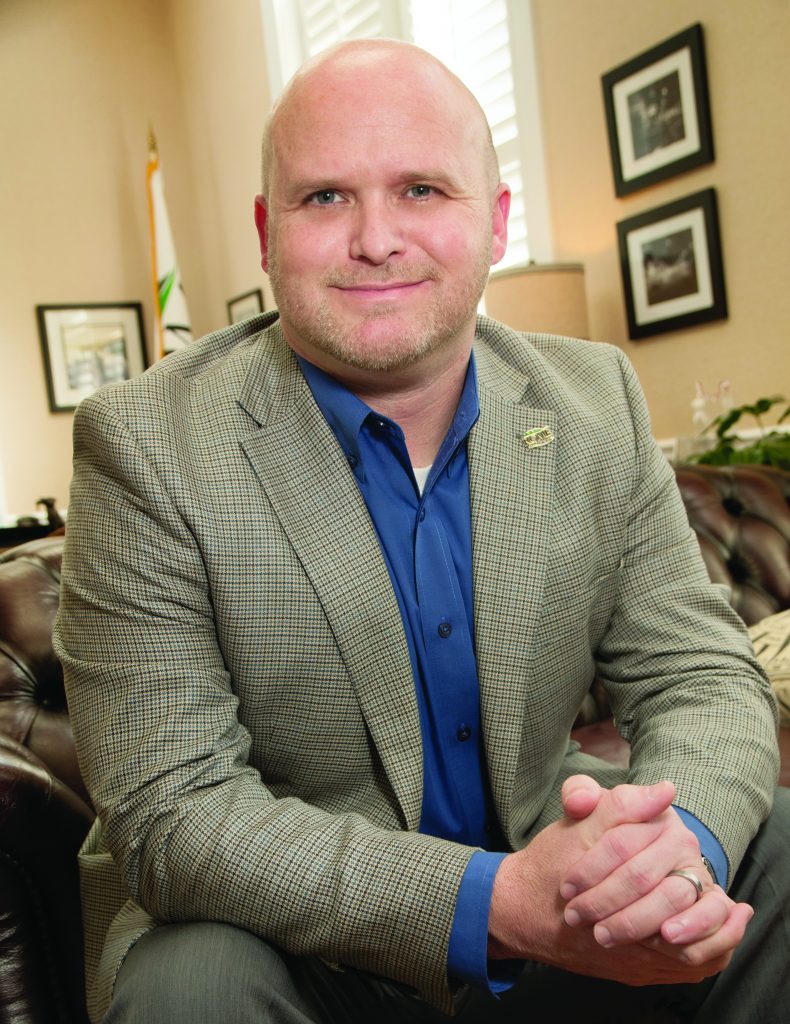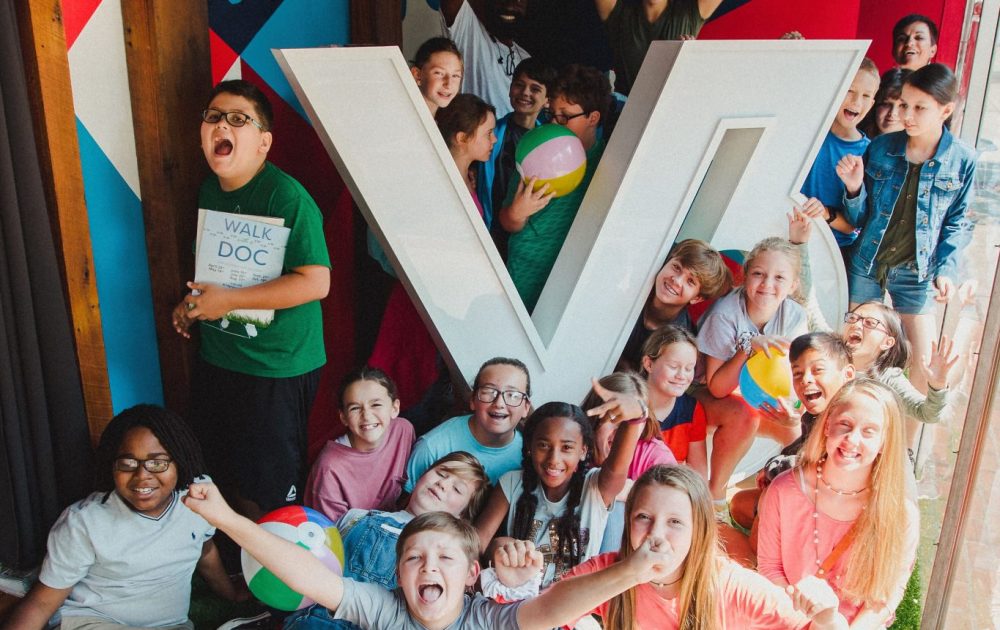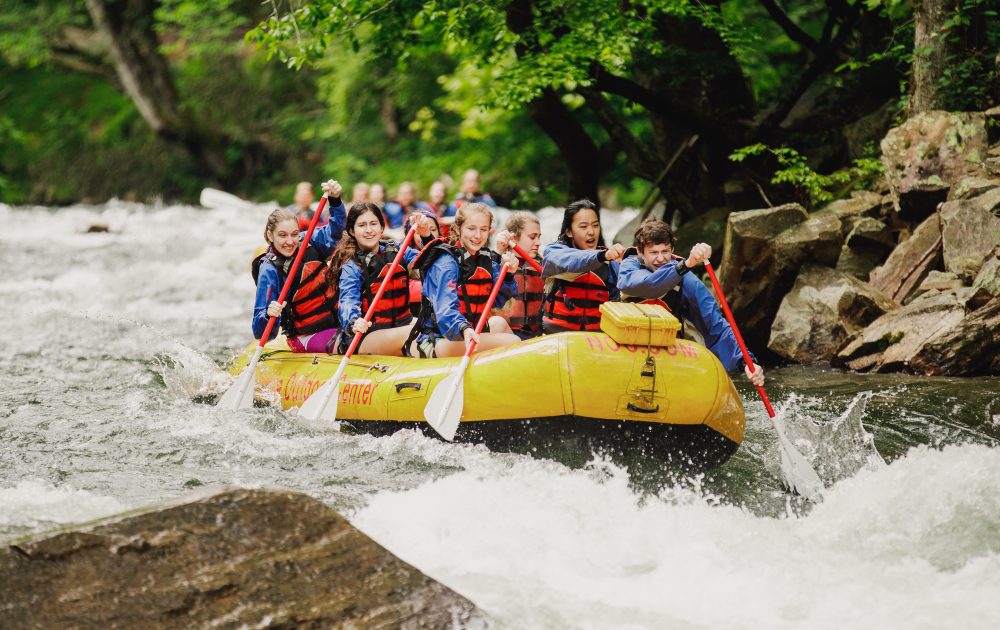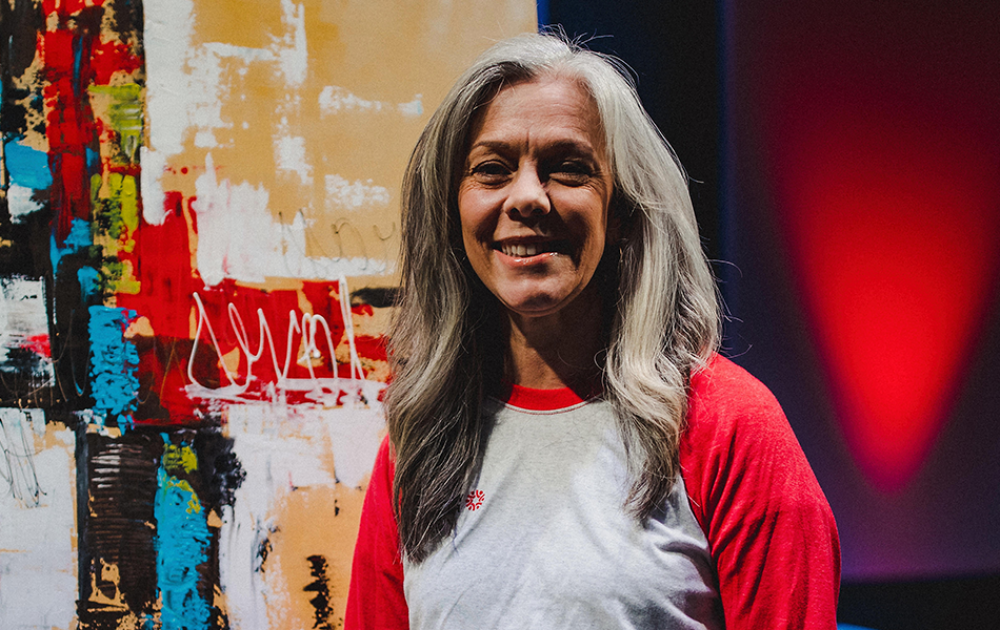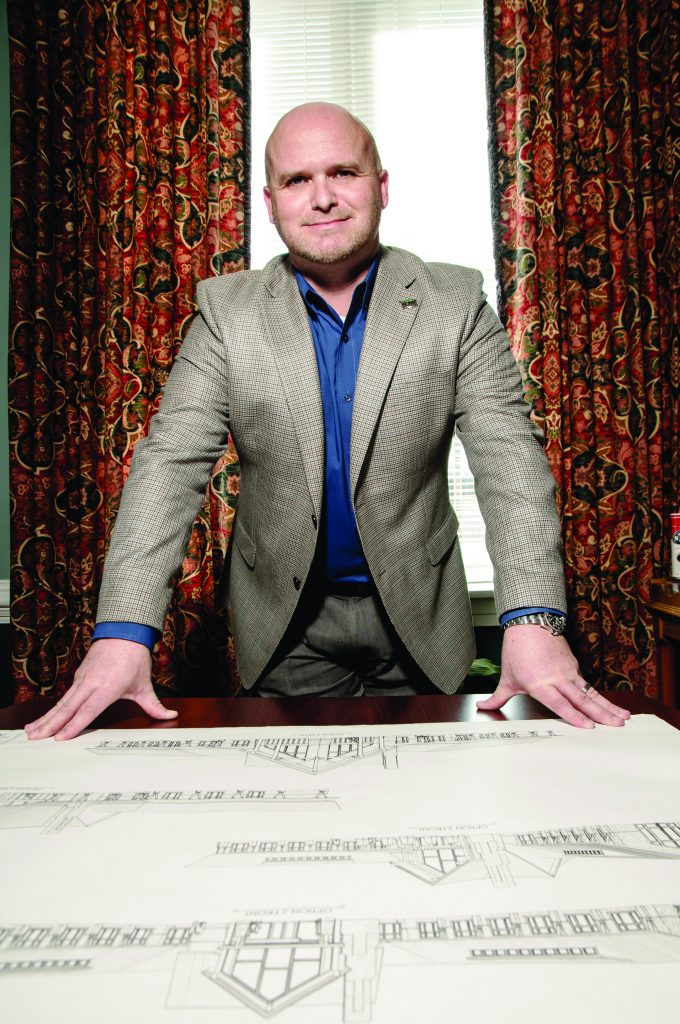
Photography by Derek Bell
V3: So give me a brief history on the man, the myth the legend, Sammy Rich. Where did you grow up, go to school?
SR: I’m originally from Chatsworth and I grew up in Murray County. I had a great American childhood up in the mountains before I moved off to go to West Georgia College in Carrollton, where I received a bachelor’s degree in geography and planning. I decided to stick around and go to graduate school. I took a year off from college before I went back to West Georgia to get my MPA. After that, I worked for the Georgia Department of Transportation. From there, I became the county planner for Carroll County. I moved to Rome back in 2002 to be the assistant county manager. I spent some time as the county manager and moved over here in 2006 to be the assistant city manager. My predecessor, Jim Dixon, retired and I came to be the assistant for seven years until John Bennett retired. Since July 1, 2014, I have had the privilege of being the city manager. That’s it in a nutshell.
What did you aspire to do when you first started college and when did it become apparent that your current career path was indeed your calling?
It’s funny that you should ask that because in high school my superlative was “most artistic,” so what are you going to do and how are you going to make a living? Originally, I thought maybe landscape architecture. Didn’t know if I would stay at West Georgia because I kind of grew up a Bulldog and always thought I would end up in Athens, but just as luck would have it I wound up in the planning program and really fell in love with that. My first job, which really finished my degree because it was an internship/job, was working in the planning department for Coweta County in Newnan, and I fell in love with local government. That was the first exposure to what it’s all about. It really becomes a calling because, you know, I tell folks this is where the rubber meets the road. It’s one thing for you to be mad at your congressman, mad at your president but it is easy to get down to city hall. You can physically come down here. If you have a problem, you can come tell us; you can pick up the phone and talk. It’s really that first line of defense. The beauty of this business is you never know what the day will hold. Day by day, you are always going to do something new, a challenge when people walk in the door or pick up the telephone.
Was there a specific moment at that first position where you said to yourself, “This is what I’m going to do for the rest of my life?”
I don’t think it was that divine. I will tell you it was sort of the evolution. As I was finishing my degree and driving to Newnan, I got that exposure to local government, going to commission meetings and just dealing with the day-to-day interactions. I think the big thing is you are like, “Wow, I get to help people.” In the government business, you are looking for a reason to say no, and some of these communities want to regulate. You can regulate your community into obscurity.
I take the position that we’re here to make the community thrive. I see my role as figuring out what else we can do to build a cool place so that entrepreneurs can come here and be successful. So you look at Broad Street and to me it’s a great incubator. You put a little public money, public investment and you let the private investment follow it. I think that’s exactly what we have here. So we try to balance that. Of course, we are going to do all the things, we are going to keep you safe, we are going to have to put fires out when things are burning, we are going to arrest the bad guys. But what else do you do? What about those quality of life things like the Town Green or the Urban River Walk-type things that make a difference in just an okay community and a real community you want to be a part of? One that you want to move your business to and you want to raise your family in? I’m all about let’s build a real community; let’s build the real stuff.
Tell our readers about the road to Rome, Ga., and your first impressions of our fine city.
Never really being a Roman, other than just driving through, you definitely get a different impression. I have told people in Atlanta that say, “I took my daughter to Berry” that you have to come downtown to really get the essence of what our community is about. You really have to feel the downtown experience. So, Rome is kind of a different story. It’s sort of two worlds, the urbanized area and then you have the outlying areas. So it really is two worlds because if I’m up at The Pocket I may as well be in Bozeman, Mont., or somewhere remote because it kind of feels like you’re in another world. And so, it’s unique. The thing that strikes me about Rome is we feel like a bigger city than we really are, and we are a small town. But we are not constrained, if you will, by thoughts of, “Oh, we are just a small town.” We are ambitious in developing our urban areas, but Rome wouldn’t have the same charm without all Floyd County has to offer.
In your time here, what have been the greatest advancements in our community?
When I got here, State Mutual Stadium was under construction. So it was a county SPLOST-funded project at the time. For the new guy, that was a really cool project and it was on the downhill side of completion. We were just starting to dream up the Armuchee connector at that time, and then the Tennis Center of Georgia became a focal point shortly after that. You know, a lot of folks think the time of government just moves so slowly and that’s true in the sense that to go from the conceptual process to having boots on the ground does take a while. The whole idea of the Town Green, bridge to West 3rd, parking deck, all that stuff were just sketches at the time I arrived in Rome. Just in my time of being here, now there is a 380-space deck, there is a Town Green, and there is the John Ross Pedestrian Bridge. And so, those things are coming to fruition. The whole idea of growing toward West 3rd was really the essence of that plan. Broad Street is doing ok. How do you get over there? How do you go to the front door of Floyd Medical Center? So those are pieces of the puzzle.
What can you share with us about West 3rd development and what do you believe that area will provide to the downtown area?
Good question. From my perspective, you end up with something that is similar to what we have on Broad Street, but yet its own unique identity. So point being as it is now, what’s over there? You’ve got the first anchor, which was the old Rome Seed and Feed store that is now River City Bank. So huge investment on the corner. We reinvested in Barron Stadium. Then you start getting in to some half-hazard development. Obviously, Marriott by Courtyard is a huge dominant for that whole area. What’s that going to look like? Then you got these old warehouse places. One of the things, if you follow along with our most recent Downtown Development Authority (DDA) planning effort, is this idea of an arts district. How does that all tie together? What I envision is two thriving urbanized areas connected by the 2nd Avenue Bridge, Pedestrian Bridge and the 5th Avenue Bridge all working together.
Community leaders talk a lot about keeping our local talent here and creating jobs for the next generation of Romans. For kids that are about to go off to school or are attending one of our many institutions of higher learning, what is your message to encourage them to live and work in Rome?
You hit the nail on the head. We are talking about millennials specifically. Where do millennials want to live? From what I keep reading/hearing, they want to be in an urban area, they want to be in a walkable community, they want to have access to amenities. They probably want to have access to the amenities of larger cities like Atlanta, Chattanooga, Birmingham, but maybe want to live in a simple place like Rome so long as they are comfortable.
So where do you live? If you want to live downtown, your options are pretty limited. And so that’s where I believe we need to evolve. We spend a lot of time talking about the upper story. Upper story is really starting to take off. There are a couple of projects now that folks are working on to develop more downtown units, but they’re higher end and I don’t see that as being a millennial target. Part of me thinks that as we move across the bridge you’re going to have more of those targets. And I think, you know, it’s one of those things where there is no magic answer of when. Is it next year, is it 10 years? I don’t know. I do think Marriott is going to be a huge key to send a signal. Once that building is out of the ground, I think all that other stuff over there is going to get gobbled up very quickly. Folks want to do some kind of speculation whether it’s restaurants or roof-top bars. Personally, I would like to see a brewery. I think in a river town it’s a shame that we don’t go down there and see the big brewery infrastructure. I think that’s an opportunity waiting to happen.
A lot of what I do as city manager is work on economic development. The Chamber is our official economic development forum, and we typically do it as a team. One of the things we’ve done as a community is work as a team. Whether it’s the Lowe’s [Distribution Center] project, even if it’s in the county, the city and county managers are at the table with the Chamber staff. We focus on the jobs that are advanced manufacturing, healthcare related. The retail side of that has never been our focus of the economic development strategy. But in a lot of communities, that’s not the case. In a lot of places, the Chamber themselves will go and recruit. Oh you don’t have a Target, well we’re going to work on it. Some states, such as Alabama, offer incentives for retail but we don’t do that. We are very focused on the manufacturing sector. So in our model, what’s typically the case is a lot of the things that people want, Target, Publix, those things, they chase the rooftops. It’s a simple equation of population. I think when the demographics there, they want to come join. My theory is you keep putting the pieces of the puzzle together so that other folks can come be successful and set up shop. What do we do to make the environment? Things like opportunity zone, where it’s a tax-driven incentive. Let’s develop census tracks so you are receiving job tax credits. Our job is to make the environment fruitful so someone can come in and take advantage.
So what are the steps you take to get there?
We have to set up, have the wherewithal to be thinking far enough to get them here. For instance, Northwest Georgia Regional Hospital was a big loss to the community – 500 jobs gone. Vital services gone. That’s a huge hole in our community; it’s also a huge opportunity. So, as you may know, we have an option on that property with the State Properties Commission. We are just now sifting through proposal to find a land planner who can help us as. Someone who can come in say here is this site; here’s where it is in the greater context, across the road from Berry, down the street from Harbin and Redmond. Help us dream up what this might become. What kind of incubator space, what kind of industrial site, what kind of mixed-use community? We don’t know, so the sky is the limit. That’s the kind of thing we are trying to do now. So it’s not “let’s sit back and see what happens,” but “how can we be proactive?” Can we make a biotech park? Maybe we can facilitate that. So that when Al Hodge [CEO of the Chamber] is down at The Capitol, he can preach to the world, “We have the perfect 130 acres, so come to Rome. We’ve got something to offer.” Our approach is:how do we take a bite of the elephant? A little here, a little there. No one silver bullet. Recruitment is ongoing; it never ends. It is always there.
I know you talk about connecting the dots downtown, but what about the gateways that lead to the heart of Rome. It seems like a natural progression to revitalizing downtown to extend out to the airport and Tennis Center, but what about West Rome and North Broad?
I live in West Rome and I think there is a lot of density in West Rome. Part of it is a cycle. Here is the reality – Rome was established in 1834; we are an older community. As part of that, you have old early successes, textile miles, General Electric. So part of our reality is that we have an older housing stock and, in many cases, that older housing stock leads to some opportunities for decline. So it’s one of those to where it’s kind of a delicate balance. The beauty of Rome is that it has been slow and steady, unlike the interstate communities. They look like everywhere else, tons of people moved in when things were going good. It busts, economy goes bad and everything dies. We’ve never really been that community. Rome has always been pretty much stable. Even with our bumps, it’s still stable.
So part of our goals and strategies concern paying attention to our portals. What’s your impression going down Riverside Parkway? It’s a different impression than going down North Broad or some other parts of the community. To start that process, to start thinking and inviting the community, to think about it and have that sense of pride is important. In our bigger context is redevelopment like what we have done with South Rome. We have a lot of lessons learned there and we are trying to apply that to other parts of town. That is an ongoing challenge.
You mentioned the Tennis Center and the Armuchee connector. Specifically in this case, the connector created a 78-acre parcel and 39 of that is dedicated to tennis, so as you know it’s a partnership. We have community SPLOST dollars to build the facility and an independent community board made of different individuals. It’s not so much about tennis as economic development. The beauty of Tennis Center of Georgia is that it allows us to facilitate larger tennis tournaments, which produces economic impact. So when your hotels are full, your restaurants are full, and people are out and about shopping, it is good for everyone. It is definitely good for the community.
In addition to that, what does the Tennis Center attract to the adjacent properties? What is it going to do for the mall? You can envision a walking path to the mall, a hotel/conference center being adjacent. A lot of what we have talked about is the village concept. Some people ask, “Why did they put it so far out there?” But when I jump in my car and take the Armuchee connector, it’s like three miles. So, it’s really not that far. I guess it’s just a perception, but I expect great things to spring from the Tennis Center.
From law enforcement to medical facilities, those in the know speak of the outstanding culture of cooperation in Rome and Floyd County. Please share your thoughts and experiences with this and tell our readers how it contributes to the greater good of the community as a whole.
I will tell you it’s unique. We often tell folks, specifically in the government side – outside of the communities that are consolidated like Athens/Clark County and Columbus/Muskogee County – that we probably more inter-governmental with Rome-Floyd than any other community in the state. It really does make a difference. And again, what’s my job? How do we do this efficiently? Building inspection, planning department, zoning, we do that. City employees, we provide that service county wide. We think that’s most efficient way to do it. We have a consolidated fire department. They are city employees; it’s jointly funded. We split the difference, city and county. If you are county resident, you pay an unincorporated tax rate. If you are in the city, we use part of the general fund. So we split that $12,000,000 budget. It is one set of chiefs, one set of rules. We think it’s a very efficient way to do it. When you’re at the table recruiting, you are working with a potential company to have a one-stop shop. We eliminate the issues of having to talk to multiple people in different departments. It’s how we do business and I think it makes Rome unique.
The SPLOST has contributed so much to the betterment of our community. What are your thoughts on past SPLOSTs and SPLOSTs of the future?
SPLOST in this particular community has always been a tough sell. When you look at votes and the precincts, the city voters always vote yes and the county voters always vote no. You have the urbanized area and you have the fringe. A lot of folks don’t want services. “I choose to move out to the periphery and I don’t want my garbage picked up. If I need government, I will call you; otherwise, leave me alone.” I understand that. I think that permeates into some of the mentality of SPLOST. Why would I vote to tax myself? I am not going to benefit from it.
But as a community, to me, the advantage of SPLOST is pretty simple. Everyone pays, not just everyone here. Forty percent comes from folks that don’t even live here – the folks that have no vested interest in our community, but who are investing in it just by passing through. I don’t know how you can pass that up. When you look at what we have done through SPLOST, and the project list is long, they are things that otherwise we would not have been able to take advantage of without increases in property tax. Taxes in general create a negative connotation for virtually everyone. But we still want the police to show up when we call them, we still want the firemen to come put out the fire, you don’t want to drive on a bad road, and you want water to come out of the spicket when you turn it on. So, essentially, we want but we don’t want to pay for it.
The reality for us is we have to balance the budget. How does this $30,000,000 general fund operation look and work. My goal is to provide services as efficiently as we can and I think we do a pretty good job of that. But to deliver capital projects, that’s the struggle. Where do you come up with that money without SPLOST? I think SPLOST has made a world of difference in what Rome is today. Not saying we wouldn’t have done it some other way, but not to the extent to what we have done today.
What are some of the exciting projects on the horizon and what are some of your goals over the next 5-10 years for Rome?
We work in a glass house; there are really no secrets. A lot of things we have already talked about. What’s the evolution, what happens when you add the hotel, what happens when 5th Avenue takes off if we do end up with the redevelopment? That’s very exciting to me. The Regional Hospital – that’s a huge bucket of possibilities. That site in the center of this community, all the utilities are already there. When you think about all the possibilities that’s extremely exciting. The pieces of the puzzle are in place, now let’s see what happens.

